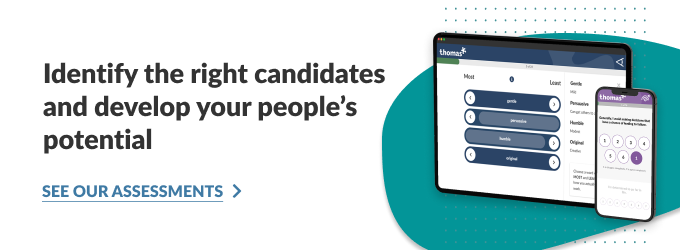Businesses worldwide have long been reaping the benefits of psychometric tests provided by psychometric testing companies. This invaluable candidate assessment method can help businesses save time and money. It can even help identify an individual’s long-term potential by exploring and measuring their type of personality, behaviors and cognitive ability.

In this article, we discuss why you should use psychometric tests in recruitment, how to go about performing them, and the kind of traits or skills they evaluate. As psychometric providers here at Thomas, we offer a full suite of psychometric tools, designed to help make the recruitment process more robust and reliable.
Read on to find out exactly what is a psychometric test in recruitment, what recruiters are looking for, the different kinds of psychometric test, and answer the question, why do employers use psychometric tests?
What is psychometric testing in recruitment?
Psychometric testing in recruitment refers to a variety of tests and tools that measure a candidate’s suitability for a role or organization. These tests cover several different areas and subject matters. Different tests are used to determine a candidate's job suitability including verbal reasoning, logical reasoning, situational judgment and numerical reasoning.
Psychometric aptitude tests measure a candidate’s abilities as well as their intelligence levels and help explore aptitude which pertains to numerical, verbal and logical skills to determine problem-solving and information processing speed.
Other psychometric assessments explore personality, behavior and emotional intelligence to look at how candidates communicate as well as their potential for leadership.
It is common for candidates to appear to be a good fit for a role based on their skills, but experience will tell even the best recruitment and hiring managers that skills and industry background aren’t always a good fit - or the thing that always matters.
Factors such as personality traits, approach to work and communication skills are significant in predicting how well-suited someone is to a job role and organization.
A psychometric test helps to provide insight into a candidate’s personality traits as well as revealing their logical processes, aptitude for problem-solving, and ability to interpret and analyze a range of data.
Why psychometric tests are used in the recruitment process
Typically, candidates are assessed by reviewing their CV or resume, conducting an interview (or a series of interviews), and perhaps assigning them a task or project. But why do other employers use psychometric tests?
Psychometric tools in recruitment offer more detailed and insightful information than these traditional assessment methods. They can help to assess aptitude or the type of personality, and explore things like an individual’s communication style, emotional intelligence and behaviors as they relate directly to the workplace.
These insights allow employers to determine how well you might work within a team, your management style and your willingness to follow the rules or take risks, for example. These are all key indicators of whether someone is right for a job within a particular company.
Another key element of a psychometric assessment is that it provides interviewers with a personality assessment that helps them to understand how suited a candidate is to different roles - i.e. assessing whether a candidate is suitable for a client facing role or if they will fit well into an existing team - and these are just two examples of the advantages of using psychometric testing.
Another advantage is that not all candidates interview particularly well - they may have an off day or a mental block to interviews, a psychometric test removes the reliance on interviews. By asking scenario based questions, interviewers can build a better idea of a candidate based on their responses as they play into the psychometric analysis.
Many experts in the recruitment industry have warned against over-reliance on psychometric tests, noting that over-using aptitude tests can put potential applicants off and unnecessary personality assessments can cause emotional upset in some candidates.
Critically psychometric testing insights provide value long after the initial recruitment process. Not only can they reaffirm the caliber of a recruit, but they also equip hiring managers with the information needed to inform future progression conversations and ensure high levels of job satisfaction and engagement.
Psychometric tests must be:
- Objective - Score must be unaffected by the assessor's beliefs or values
- Standardized - Tests must be consistent and administered under controlled conditions
- Reliable - Errors must be minimized
- Predictive - Tests must provide an accurate prediction of performance
- Nondiscriminatory - Tests mustn’t put any group at a disadvantage due to race, age, gender
What recruiters are looking for with psychometric testing
Depending on the role, hiring managers will look for different things when conducting skills assessment tests for employment. Take a high-pressured Head of Marketing position as an example. This post might require an individual that works well in stressful environments, communicates effectively with stakeholders at all levels, and someone who’s a natural-born leader.
On the other hand, a technical IT vacancy may call for an individual who is both methodical and disciplined and works well independently. In the same way, you’d want a team leader to possess high levels of emotional intelligence, while an editor will need to demonstrate a solid score for error checking (there is, in fact, a psychometric test that looks at an individual’s ability to spot inaccuracies in information).
For each of the scenarios, there’s a specific psychometric test or series of tests that will measure each of the individual traits explored.
Psychometric tests however provide other benefits to the recruitment process including:
- Eliminating unsuitable candidates at an early stage
- Screening candidates for interviews
- Objectively determining someone’s ability, personality, motivation, values and reactions to their environments
- Identifying the strengths or weaknesses missing in existing teams and helping to make strategic recruitment decisions
- Providing management with guidance on career progression for existing employees
And there are additional reasons why recruiters use psychometric testing which include:
- Best predictor of job performance. By including test results in the decision-making process, you increase the chances of making a good hire who better fits your company culture.
- Decision making is supported by objective data. Deeper candidate insights help when selections need to be made.
- Provide added value for candidates. Personality questionnaires and situational judgment assessments prompt candidates to consider their thinking and attitudes. Also - discussing tests with candidates helps improve their self awareness.
- Helps with candidate onboarding. Positive onboarding experiences are key in retaining top talent.
- Helps with long term employee development. Training and development can be better personalized to the individual needs of new hires.
- Reduces hiring bias.

Does psychometric testing work in recruitment?
Psychometric assessments are said to help employers make more effective and informed decisions in the hiring process, generating more information about a candidate, showcasing strengths and weaknesses and identifying potential progression opportunities for later on.
But do they really work?
Studies have shown that psychometric testing can, indeed, save time and money while recruiting, and employers have admitted to feeling more confident when choosing candidates. Experts in the field maintain the reliability and accuracy of these tests but also advise that these tools are best used alongside traditional methods such as face-to-face interviews. One study found that 75% of The Times’ Top 100 Companies were using psychometric testing alongside other tried and tested recruitment methods and tools.
A psychometric test for recruitment benchmarks candidates in a way that is often difficult to do with other methods, such as interviews. By scoring candidates on set criteria, it becomes easier to distinguish standout candidates and shortlist the most promising ones more quickly.
With all that said, more traditional assessment methods do still have a place in recruitment. In other words, psychometric tests on their own are not enough to inform all hiring decisions. Companies can make the most out of their recruitment process when using psychometric testing alongside other traditional recruitment methods. And it’s crucial to ensure recruiting is performed optimally, given the costs of poor hiring. In fact, the cost of a poor hire doesn’t only relate to recruitment fees, training and loss of productivity - it can also have a severe impact on company morale and culture.
Advantages of psychometric testing work in recruitment
Psychometric tests are designed to provide objective and measurable data to help managers make informed decisions for hiring. Psychometric assessments for recruitment provide insight into candidate intelligence levels, values, as well as behaviors and motivations.
In other words, they can help managers delve into how and why a candidate might act a certain way, for instance, during a high-pressure sales call or when working as part of a team. Psychometric testing can assist hiring managers in:
1. Understanding how people will behave at work
Understanding how someone will behave in the workplace is key to hiring. Psychometric tools that focus on behavior and personality will be able to provide you with data indicating a candidate’s preferred communication styles, their ability to stay calm under pressure and what motivates them as an individual.
2. Identifying leadership potential in job applicants
A key determinant of leadership potential, leadership assessment tests will help you determine whether or not a candidate could be a future leader. In doing so, they can support better succession planning. The insight these kinds of tests offer help to inform 121s where progression is a crucial point of discussion. They can also maximize engagement and ambition levels among employees.
3. Accurately testing general intelligence of candidates
Psychometric assessments explore aptitude and ability by measuring a candidate’s intelligence levels against others. This method of measuring cognitive ability can inform how long it might take a candidate to pick up new skills, how well they’ll deal with words or numbers on the job, and how quickly they might process information, for example.
4. Interpreting candidate emotions and their ability to maintain relationships
By assessing the emotional intelligence of a candidate with psychometric tests during recruitment, you can derive how well they might work with other team members, understand their specific way of communicating with others and predict what kind of manager they might be.
What are the key benefits of psychometric tests in recruitment?
Up until now, we’ve focused mainly on the benefits of psychometric tests as they pertain to employee assessment; however, the organizational gains extend well beyond this. Integration of psychometric assessment with the candidate selection process can result in recruitment efforts that are more time-efficient, cost-effective, consistent and standardized.
As a result, psychometric testing can become an invaluable business asset that not only streamlines recruitment but also ensures a robust selection process, designed to surface only the most suitable candidates. Psychometric assessments help:
1. Bolster face-to-face interviews
Face-to-face interviews – whether structured or unstructured – help to form an initial impression of a candidate. That said, nerves can present a real factor in how someone might come across. For instance, someone could perform terribly in an interview but possess all the skills and characteristics needed for the job.
In the same way, a candidate who gives a great interview doesn’t always equal a great employee. Using psychometric tools alongside interviews means you don’t have to rely on face-to-face performance alone. You’ll have more takeaways and insights to hand, which helps to make decision making a lot easier.
2. Save time across the recruitment process
Psychometric tests offer a great deal of information about a candidate in a short space of time. That makes these tests an invaluable investment for mass recruitment drives, such as graduate assessments when you’ll need to whittle down to a shortlist from a large pool of applicants as quickly as possible.
3. Highlight candidate skills and abilities (rather than just education and experience)
A candidate’s CV or resume may outline their professional achievements and educational background, but it won’t necessarily delve into a detailed skillset review relevant to the role being recruited. This data is invaluable in identifying the right skills or personality traits for the particular vacancy in question.
4. Forge consistency throughout recruitment
Psychometric testing allows you to work with a trustworthy model time and time again, creating uniformity at macro and even micro recruitment levels. It also offers benchmarks and insights you can revisit later down the line to help with the progression and engagement of future employees.

What are the different types of psychometric tests?
Psychometric assessment tools are suited to different purposes and outcomes, and we can work with you to identify which tests will be right for your organization. Of all the traits psychometric tests evaluate, there are four main groupings or categories: aptitude, behaviors, personality and emotional intelligence.
While aptitude measures cognitive abilities, behavior testing will look at how a candidate acts or communicates. Personality testing explores candidate traits and how they might fit with a particular role whereas E.I., or emotional intelligence, can be measured through its own set of tests. Here’s a more detailed breakdown of the different types of psychometric tests available.
Psychometric aptitude testing
Psychometric aptitude tests are used to measure a candidate’s cognitive abilities. With these types of tests, there’s usually a minimum score, which will help to determine intelligence levels in an individual. Let’s take a look at the different types of aptitude tests available:
- Numerical - As the name suggests, numerical psychometric tests will explore how quickly and easily a candidate works with numbers.
- Verbal - Verbal psychometric tests will explore a candidate’s understanding and comprehension skills with written extracts, usually with a multiple-choice answer format.
- Inductive - This type of psychometric tool will measure the candidate’s ability to think methodically, usually using graphic sequences.
- Diagrammatic - These types of tests will explore a candidate’s ability to problem-solve. Typically, candidates will get about one minute to answer each question.
- Logical - Just like you’d expect, these tests are designed to measure an individual’s ability to think logically. These tests are similar to diagrammatic testing, but may not use diagrams.
- Error checking - This one’s also reasonably self-explanatory, gauging how a candidate identifies errors within information.
Behavior testing
By assessing and understanding a candidate’s behavioral style, we can explore things such as their preferred way of communicating, how they might handle setbacks, or how they would approach managing a team.
This kind of insight is crucial in identifying development areas, maximizing engagement and establishing whether an individual would be a good cultural fit for a team or organization.
One example of behavioral tests is Thomas’ Personal Profile Analysis (PPA) which is rooted in William Moulton Marston’s DISC theory uses four main profile factors: Dominance, Influence, Steadiness and Compliance to provide information on an assessment taker’s fears, motivators, values and behavioral style.
In order to complete the PPA, candidates choose two trait adjectives from a block of four, one 'most like' and one ‘least like’ them. This process is repeated 24 times, giving 48 choices from a total of 96 words. An individual’s response patterns are compared to themselves rather than the scores of a comparison group.
Personality testing
Personality tests (also known as occupational tests) measure a candidate’s suitability for a role by exploring interests, values and behaviors.
One example of a workplace personality assessment is Thomas’ High Potential Trait Indicator (HPTI) that provides insight into how individuals approach their work and whether their strengths may become their derailers. Specifically, it can help identify leadership potential by exploring a person’s personality traits.
The Thomas HPTI is a self-report questionnaire where candidates are asked to indicate their level of agreement on a 1-7 Likert scale (1 ‘disagree completely’ to 7 ‘agree completely) across 78 questions.
The benefits of personality testing are similar to those of behavioral tests and will help determine how well an individual will integrate within a team or company.
Emotional intelligence testing
A person who is highly emotionally intelligent will be much better equipped to recognize their emotions and those of their peers. They are also able to use that information to inform thinking and behaviors. By testing emotional intelligence in candidates, we can identify how effectively they can communicate with others in the workplace.
One example of emotional intelligence testing would be the Trait Emotional Intelligence Questionnaire – also known as the TEIQue. This test of more than 150 questions explores 15 different traits in a candidate, including sociability, self-control and wellbeing. Similarly, the Emotional Intelligence Questionnaire (or EIQ), will review a candidate’s attitude to the likes of influencing, integrity and intuition.
As with behavior and personality testing, evaluating a candidate's level of emotional intelligence can help establish if there will be a strong culture fit. The results may also indicate whether a particular candidate shows the potential to lead, as emotional intelligence plays a key role in effective management and leadership.
Thomas psychometric assessments
Thomas behavioural assessment
In 8 minutes, this simple assessment involving just 24 questions will help you to uncover and understand more about the candidate and how they behave and why they respond in certain ways to a variety of situations.
Thomas workplace personality assessment
In this 10 minute assessment, candidates will answer 78 questions which will provide a wide ranging report. Powered by High Potential Trait Indicator (HPTI) which was developed by Ian MacRae and Adrian Furnham in 2006, this assessment is a powerful tool in understanding your candidates.
Thomas aptitude assessment
The Thomas aptitude test involves 5 online assessments and takes between 30 to 45 minutes to complete. Known as the General Intelligence Assessment, or GIA, the GIA is a cognitive ability assessment that can help to predict how quickly an individual will take to get to grips with a new role or regime.
You can request a demonstration of all of these products with our team.





